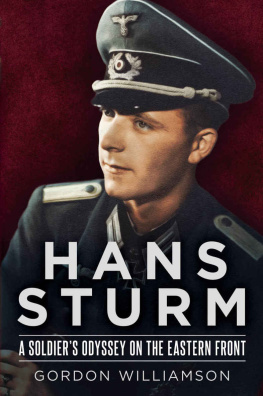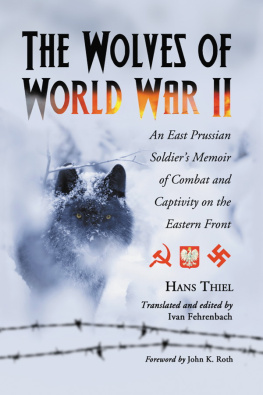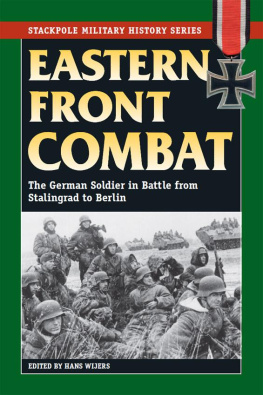

Fonthill Media Language Policy
Fonthill Media publishes in the international English language market. One language edition is published
worldwide. As there are minor differences in spelling and presentation, especially with regard to
American English and British English, a policy is necessary to define which form of English to use. The
Fonthill Policy is to use the form of English native to the author.
Fonthill Media Limited
Fonthill Media LLC
www.fonthillmedia.com
First published in the United Kingdom and the United States of America 2015
British Library Cataloguing in Publication Data:
A catalogue record for this book is available from the British Library
Copyright Gordon Williamson 2015
ISBN 978-1-78155-393-0
The right of Gordon Williamson to be identified as the author of this work has been asserted by him in
accordance with the Copyright, Designs and Patents Act 1988.
All rights reserved. No part of this publication may be reproduced, stored in a retrieval system or
transmitted in any form or by any means, electronic, mechanical, photocopying, recording or otherwise,
without prior permission in writing from Fonthill Media Limited
Typeset in 10pt on 13pt Sabon
Printed and bound in England
CONTENTS
Dedication
This book is respectfully dedicated to the memory of Hans Sturm.
When I suggested to him that I wanted to create a book about his experiences for the English-speaking reader, more detailed and accessible than a previous, 70-page publication in which they appeared in Germany in the 1960s, he willingly agreed to put pen to paper for me.
Over a period extending into years he would send me reminiscences and epistles, which I would translate, collate, and pull together into book format. The process was almost like reading an adventure novel: I always found myself anxiously waiting for the next chapter to arriveonly this was not fiction, but real life.
In adapting the material for the English reader, I have kept the text as true to Sturms original notes to me as possible, only making changes when an alternative term was required where the original German had no direct English equivalent.
I am honoured that Sturm allowed me to carry out this task, and to present his story to a wider audience.
Sadly, the publishers I approached some years ago felt that the time was not right for the memoirs of ordinary German soldiers, only famous generals or fighter aces seeming to be in vogue. Tastes have changed in recent times and now many biographies and autobiographies of common German soldiers are making their way onto the bookshelves. I am delighted that, thanks to Fonthill Media, I can keep my promise to Hans Sturm: his storythat of an incredibly brave young soldierwill not go untold.
Gordon Williamson
Foreword
I was pleasantly surprised when my friend Hans Sturm and Gordon Williamson, the noted author of several excellent books and articles on Second World War history, asked me to write a few words as an introduction to this work. Of course, I was only too honoured to agree to such a request on behalf of Hans, a soldier of the Old School and a true gentleman. His accomplishments, both on and off the battlefield, are worthy of our respect and study.
As one who entered military service in 1978, I will never be able to fully comprehend the hardships, privations, and physical pain Hans endured during both the Second World War and the subsequent years in Soviet captivity. However, I can admire Hanss dedication to duty, loyalty to his comrades, and heroism on the battlefield, for these are the ideals that every person who serves his country strives to fulfil. Events beyond his control threw Hans, like millions of other young men of his generation, into a global conflict. With thoroughness and candour, Mr Williamson relates how Hans strove to do his duty as best he could and return home to his family.
It is through Mr Williamsons words in relating to us Hanss ordeals as a combat soldier that we should pause and rise above the politics of the Second World War in order to draw lessons for the future. Only then will all the suffering and destruction the world experienced not have been in vain. Regardless of their nationality, soldiers like Hans Sturm endeavoured to display both moral and physical courage. Hanss heroism was deservedly recognised by his being awarded Germanys highest decoration for bravery, the Ritterkreuz of the Iron Cross. More than 15 million men saw service in the German military between 1939 and 1945; however, only approximately 7,300 men were to become Ritterkreuztrger . Hans told me that he wore this coveted award in remembrance of his fellow soldiers whose sacrifices went unrecognised and for those who paid the ultimate price in battle.
The Second World War was the defining event of the twentieth century, and the Cold War that it ushered in caused an Iron Curtain to descend between East and West.
That curtain is now thankfully gone. Germany is once again a united country. Russia and the now freed countries of Eastern Europe are pursuing democracy and market economies. Yet, in the waning euphoria over the end of the Cold War, the world remains a dangerous place. As Hans so admirably displayed more than fifty years ago, integrity, loyalty, sacrifice, and bravery must remain the touchstones for defenders of peace-loving countries around the world.
David L. Sims
Lieutenant Colonel
United States Air Force
Introduction
My first contact with Hans Sturm was the result of a fortuitous accident.
At the time I was carrying out research into the famous Grodeutschland Division and had thought I was writing to a Ritterkreuz -winning soldier from this unit with the same name.
Despite the obvious case of mistaken identity, this Hans Sturm wrote back a very polite and friendly letter enclosing a signed copy of a wartime photograph showing him in uniform and wearing his Ritterkreuz , as well as a brief Lebenslauf or summary of his military career.
I was intrigued to read that he had not only won this high decoration as a mere Gefreiter , or Lance-Corporal, but had in fact been awarded a whole string of military decorations over a period of just a few months of service on the Eastern Front. My curiosity was roused and I wrote back asking for more information. This was to be just the beginning of a long period of pen-friendship in which I gradually grew to know more and more about this fascinating character. One of the items sent to me was a copy of the German veterans magazine Der Landser , in which was contained a narrative report of the exploits which won this gallant young soldier the Ritterkreuz . I was warned, however, that the author of the piece had used some artistic license in his writing, which was not entirely accurate.
In 1991, my wife and I were able to take up Hans Sturms gracious offer to visit him in his Dortmund home. By a happy coincidence we arrived on his birthday, 29 July, and were made to feel extremely welcome as he and his charming family celebrated his 75th.
The great admiration I had already grown to feel for this man could not fail to be enhanced by meeting him in person. No one, in fact, who encountered Hans Sturm could fail to have been impressed. He was quite simply one of the kindest and most pleasant fellows I have ever had the privilege to meet, possessed of a charming personality and wonderful sense of humour. Despite extreme discomfort following hip replacement surgery, he insisted in being our guide as well as our host and ensured our trip was one which would never be forgotten.
Next page












